Pharmacotherapy Review
Chat with MASLD AI

Hi, I am MASLD AI.
Suggested Questions :

MASLD AI 07:02 AM

Join Christina Hanson, FNP-C, from South Denver Gastroenterology, as she provides an in-depth overview of the current pharmacologic treatment landscape for Metabolic Dysfunction-Associated Steatotic Liver Disease (MASLD) and Metabolic Dysfunction-Associated Steatohepatitis (MASH). This expert-led session explores the three cornerstones of MASH management—lifestyle and weight loss interventions, cardiovascular risk reduction, and liver-directed therapy—while highlighting the evolving role of GLP-1 receptor agonists and the recent FDA approval of resmetirom, the first medication indicated for adults with MASH and moderate to advanced fibrosis. Christina also discusses clinical trial data from MAESTRO-NASH, reviews historical agents like vitamin E and pioglitazone, and offers practical guidance on patient selection, safety considerations, and monitoring strategies. Whether you’re a GI provider, hepatology specialist, or primary care clinician managing fatty liver disease, this video provides valuable insights into how emerging therapies are shaping the future of MASH treatment.
Related Podcast

Beyond Basic NITs: When is Liver Biopsy or Advanced Imaging

In this episode, Brian Lam, PA, Associate Director of Research at Inova’s Liver and Obesity Research Program in Northern Virginia, explores the nuanced decision-making involved in going beyond basic non-invasive tests (NITs) for diagnosing and managing MASH (metabolic dysfunction-associated steatohepatitis). While FIB-4 and transient elastography are useful initial tools, Brian breaks down when and why clinicians should consider more advanced diagnostics—such as MR elastography (MRE), proton density fat fraction (PDFF), and in certain cases, liver biopsy. Learn how to assess the reliability of a TE exam, interpret discordant NITs, and when to escalate to cross-sectional imaging or histologic confirmation. This podcast also highlights the evolving role of fat fraction in therapy response, limitations in current FDA indications for resmetirom, and how emerging data may shape future clinical pathways for patients with compensated cirrhosis. Whether you're in primary care, GI, or hepatology, this discussion offers critical insights to improve accuracy in staging liver disease and optimizing treatment strategies for patients with MASH.
Watch Now
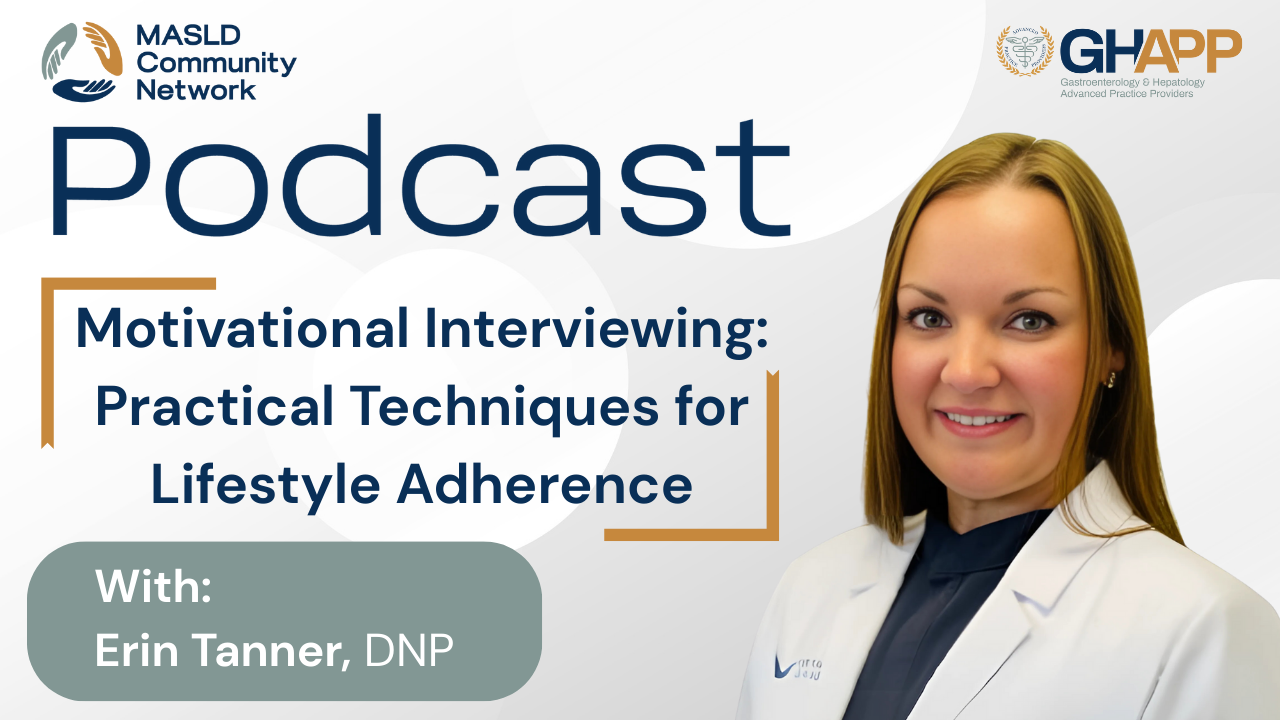
Motivational Interviewing: Practical Techniques For Lifestyle Adherence

In this engaging session from the GHAPP MASLD Community Network, Erin Tanner, DNP, from Gastro Health in Birmingham, Alabama, discusses how motivational interviewing can empower patients with fatty liver disease to make meaningful lifestyle changes. Drawing from over 14 years of experience in hepatology and gastroenterology, Erin explains how a collaborative, patient-centered approach can improve adherence to diet, exercise, and weight management plans. Using the RULE framework—Resist the righting reflex, Understand motivation, Listen with empathy, and Empower the patient—she demonstrates practical ways to foster trust and promote behavior change without judgment. Erin also introduces the SMART goals method (Specific, Measurable, Achievable, Relevant, Time-bound), guiding clinicians on how to set realistic, personalized goals that patients can achieve and sustain. Through reflective listening, affirmation, and consistent follow-up, providers can help patients overcome ambivalence, build confidence, and stay motivated on their journey to better liver and metabolic health.
Watch Now

LFTs Demystified: A Practical Guide for APPs

In this informative session, Anthony Derencius, PA-C and sub-investigator at Pinnacle Clinical Research, provides a practical and accessible breakdown of liver function tests (LFTs) and liver-associated enzymes, with a focus on their role in diagnosing and monitoring fatty liver disease—including MASLD (metabolic dysfunction-associated steatotic liver disease) and MASH (metabolic-associated steatohepatitis). Drawing from years of experience in both general and transplant hepatology, Anthony explains how to interpret key markers like ALT, AST, alkaline phosphatase, bilirubin, albumin, and GGT. He emphasizes why elevated or even normal LFTs don’t always tell the whole story, and how a full workup—including viral hepatitis panels, autoimmune markers, alcohol-related labs, imaging, and non-invasive fibrosis assessments—can help uncover the root cause of liver injury. This video also walks viewers through when to consider additional tools like FIB-4, ELF score, FibroScan, or even liver biopsy. Whether you're a primary care provider or hepatology specialist, this session will sharpen your ability to distinguish between benign lab variations and signs of serious liver disease, ultimately supporting earlier diagnosis and better outcomes for your patients.
Watch Now
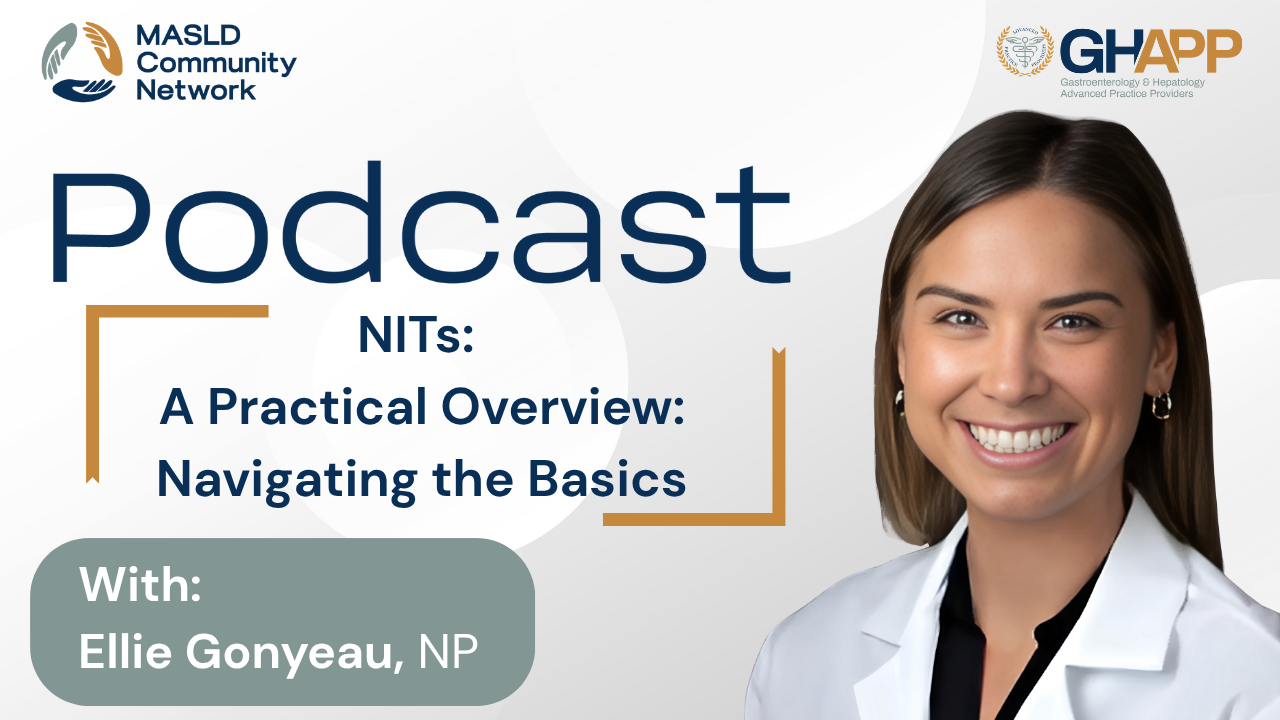
NITs: A Practical Overview: Navigating the Basics

Join Ellie Gonyeau, a nurse practitioner at Beth Israel in Boston, for an insightful podcast episode on metabolic dysfunction-associated steatotic liver disease (MASLD) and MASH, and how to effectively use non-invasive testing (NITs) to evaluate and manage patients with fatty liver disease. Ellie breaks down the differences between MASLD and MASH—explaining why distinguishing simple steatosis from inflammatory liver injury matters for long-term outcomes. She covers first-line serum-based tools like FIB-4 and ELF score, as well as imaging-based modalities including FibroScan and MR elastography, helping clinicians understand when and how to apply each test. With practical tips on interpreting fibrosis risk thresholds, stratifying patients with metabolic comorbidities, and educating primary care teams, this episode emphasizes the power of early identification, appropriate triage, and collaborative care to prevent disease progression. Whether you're working in general GI, primary care, or hepatology, this episode equips you with tools to make liver disease detection more proactive and patient-centered.
Watch Now
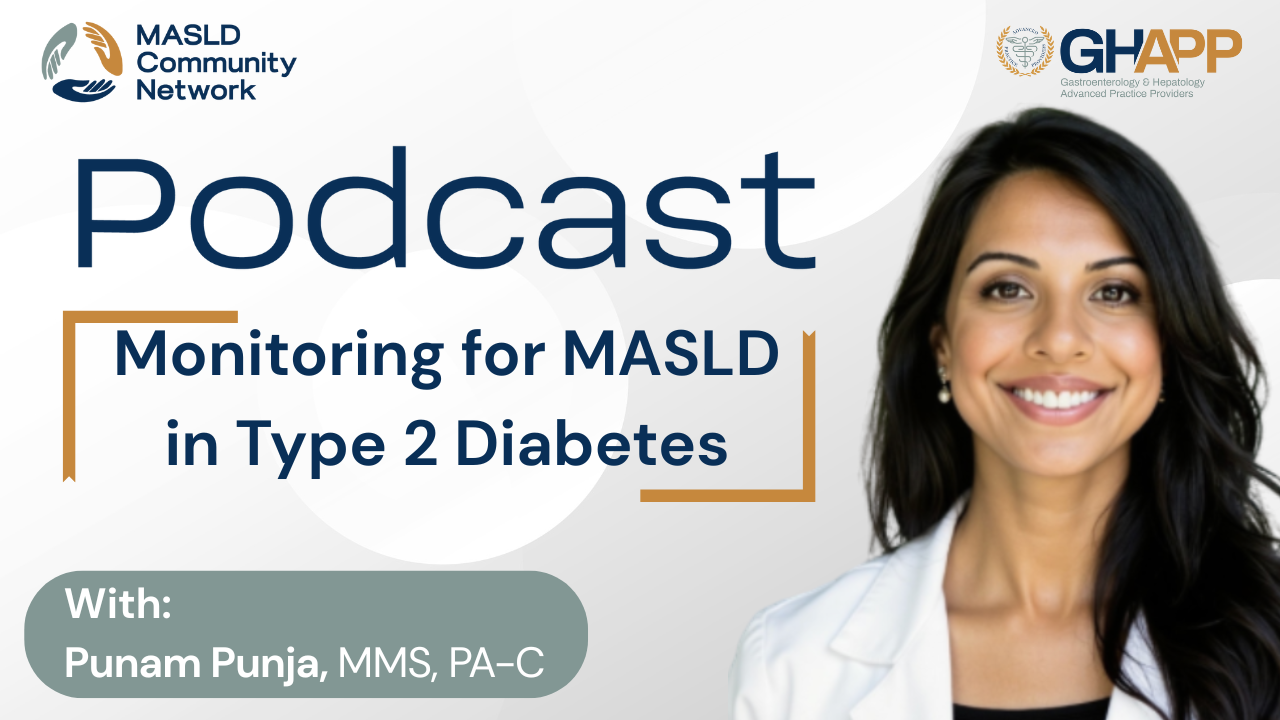
Monitoring for MASLD in Type 2 Diabetes

In this educational session, Punam Punja, MMS, PA-C, from Emory Healthcare in Atlanta, discusses the crucial connection between type 2 diabetes and MASLD (Metabolic Dysfunction–Associated Steatotic Liver Disease). With over 15 years of hepatology experience, Punam outlines a practical, evidence-based approach for screening and monitoring patients with type 2 diabetes who are at risk for MASH (Metabolic Associated Steatohepatitis). She explains how the American Diabetes Association (ADA) now recommends routine fibrosis screening using the FIB-4 index, a simple, non-invasive calculation that helps identify patients at risk for advanced fibrosis — the strongest predictor of liver-related outcomes. Punam breaks down risk thresholds, screening intervals, and the role of secondary assessments such as transient elastography or ELF testing. She also emphasizes the importance of patient education, noting that unlike diabetic complications such as retinopathy, MASH is often silent but reversible with lifestyle modification. As October marks National Liver Awareness Month, Punam encourages APPs to make liver screening a standard part of diabetes care.
Watch Now
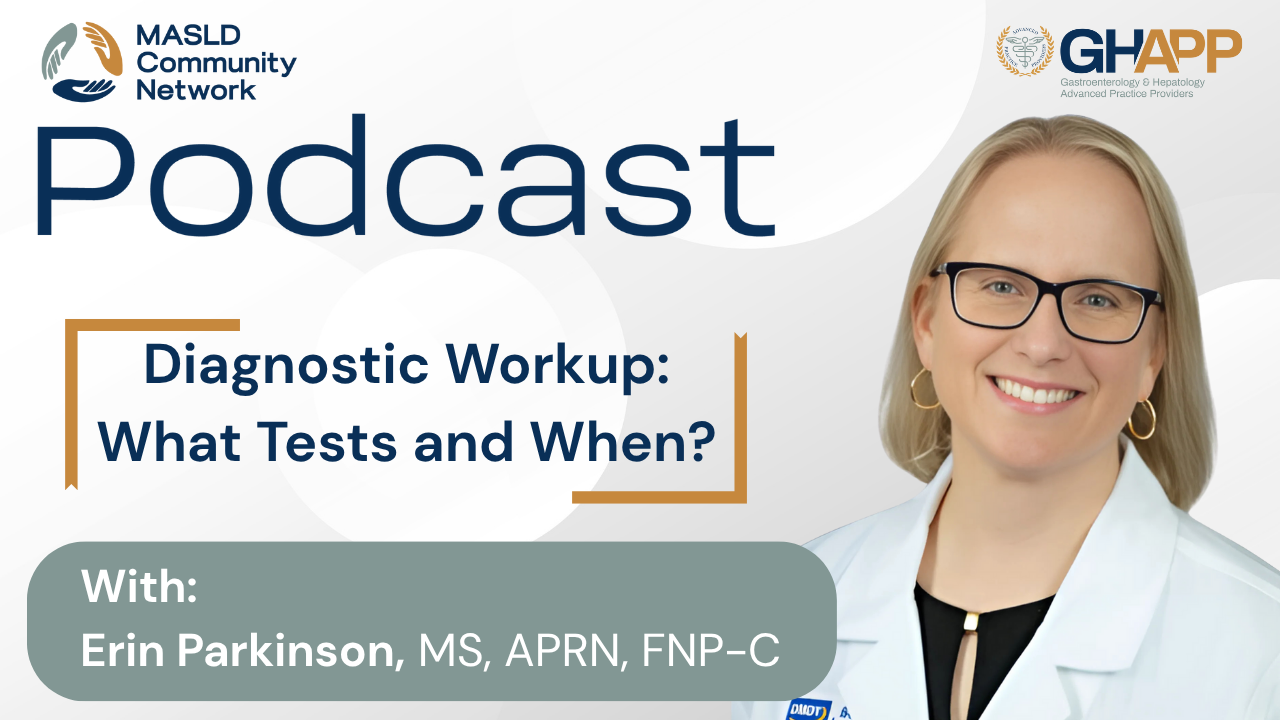
Diagnostic Workup: What Tests and When?

In this educational session from the GHAPP MASLD Community Network, Erin Parkinson, APRN, from the Transplant Institute at Tampa General Medical Group, provides a detailed walkthrough of the diagnostic workup for metabolic dysfunction–associated steatotic liver disease (MASLD) and metabolic dysfunction–associated steatohepatitis (MASH). With experience in both general and transplant hepatology, Erin explains how to identify and evaluate patients at risk—beginning with key metabolic risk factors such as obesity, diabetes, and hypertension, and moving through the essential steps of imaging, laboratory testing, and fibrosis assessment. Viewers will learn when and how to use tools like ultrasound, FIB-4, FibroScan, ELF testing, and MR elastography to differentiate mild disease from advanced fibrosis or cirrhosis. Erin also emphasizes the importance of quantifying alcohol intake, ruling out viral, autoimmune, and genetic liver diseases, and applying risk stratification to determine appropriate follow-up and hepatology referral. This comprehensive overview equips APPs and clinicians with the practical framework needed to confidently diagnose, stage, and monitor MASLD and MASH, while incorporating HCC screening and long-term management strategies for high-risk patients.
Watch Now
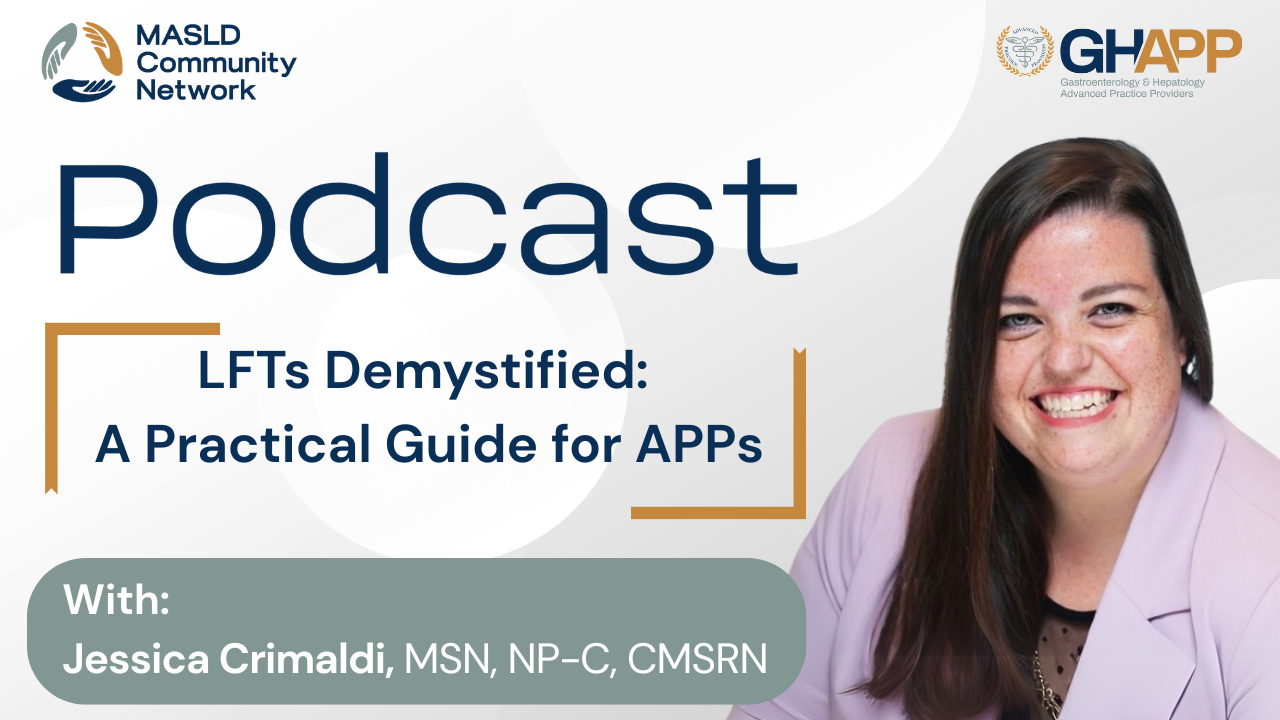
LFTs Demystified: A Practical Guide For APPs

In this GHAPP MASLD Community Network podcast, Jessica Crimaldi, NP, from the Cleveland Clinic, provides practical, real-world insights into interpreting liver function tests (LFTs) in the context of MASLD (metabolic dysfunction-associated steatotic liver disease) and MASH (steatohepatitis). Drawing on over a decade of experience in GI and hepatology, Jessica explains common ALT and AST elevation patterns that should prompt a diagnostic workup, even in asymptomatic patients. She reviews the hepatocellular vs. cholestatic patterns of injury, the value of the R-factor calculator in identifying the likely etiology of liver enzyme abnormalities, and how to differentiate MASH from other liver diseases such as PBC, viral hepatitis, or bile duct obstruction. The episode also addresses key non-liver labs like triglycerides, A1C, and cholesterol, and how they contribute to assessing metabolic risk. Finally, Jessica discusses the role of serial LFT monitoring in evaluating treatment response—highlighting what it means when liver enzyme levels fall and why "normal" LFTs don’t always indicate disease resolution. Whether you're a primary care provider or hepatology specialist, this podcast offers valuable guidance for early detection, risk stratification, and longitudinal monitoring of patients with MASH.
Watch Now
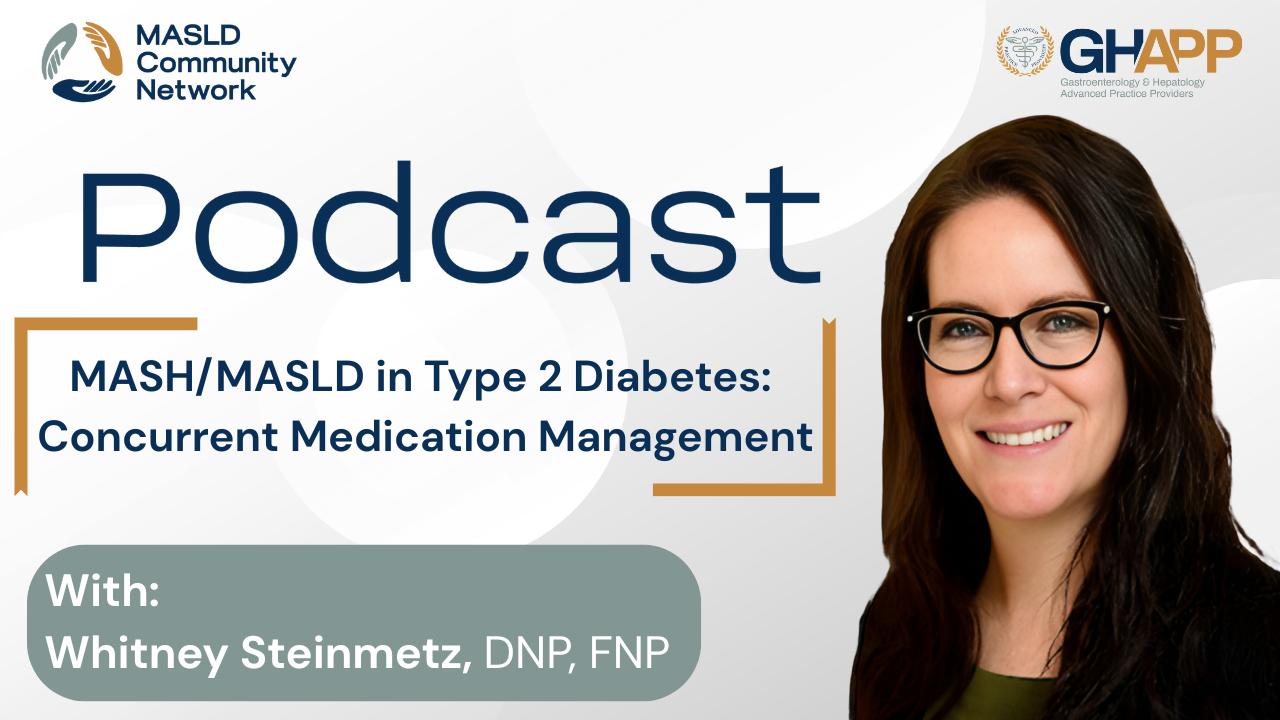
MASH/MASLD in Type 2 Diabetes: Concurrent Medication Management

In this informative episode, Whitney Steinmetz, NP from Presbyterian Medical Group in Albuquerque, NM, explores how to optimize medication strategies for patients with type 2 diabetes who are also living with MASLD and MASH. She discusses why individuals with type 2 diabetes are at significantly higher risk for developing advanced liver fibrosis—highlighting the overlapping metabolic, inflammatory, and insulin-resistant pathways that accelerate liver damage. Whitney breaks down how commonly prescribed diabetes medications—like GLP-1 receptor agonists, SGLT2 inhibitors, TZDs, and dual/triple incretins—impact liver fat, inflammation, and fibrosis progression. She offers practical guidance on selecting therapies that balance glycemic control with hepatic benefits while minimizing polypharmacy. Learn which medications may offer dual cardiometabolic and hepatic advantages, and which should be avoided or used with caution in patients with cirrhosis or advanced fibrosis. Tune in for real-world insights into how advanced practice providers can take ownership of MASH management in diabetes care.
Watch Now
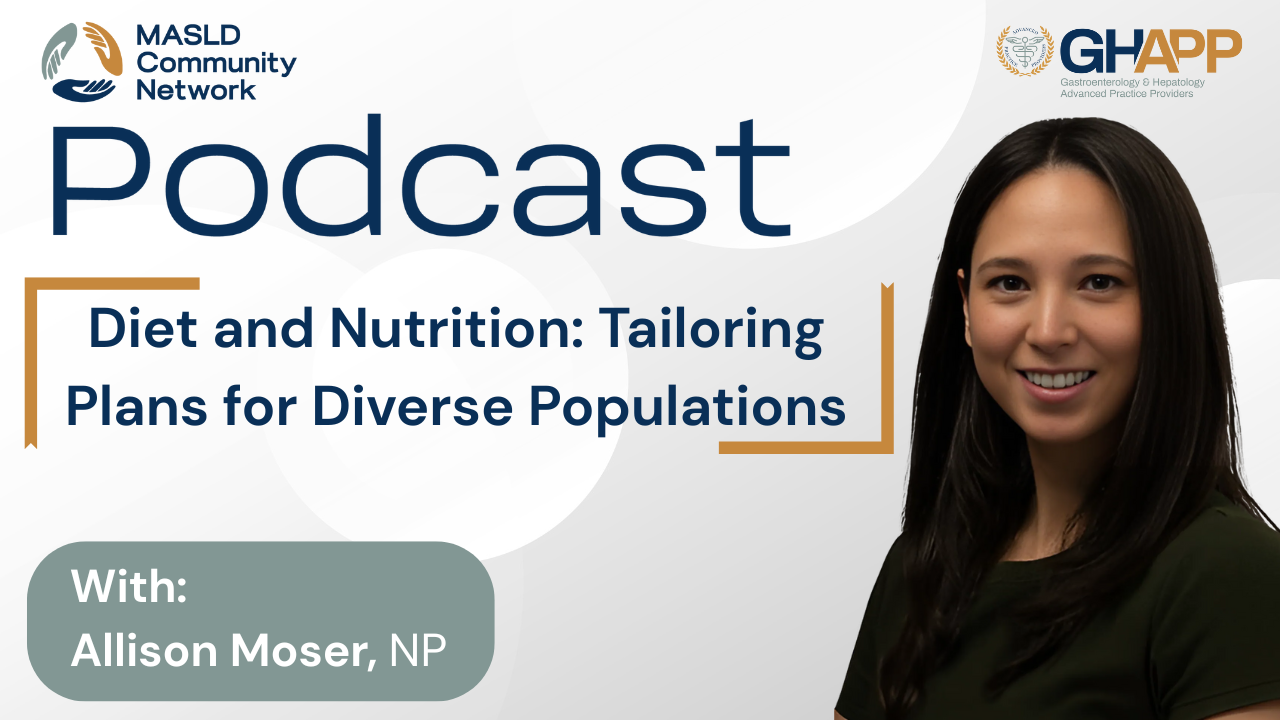
Diet and Nutrition: Tailoring Plans for Diverse Populations

In this episode, Allison Moser, NP, from Rush University Medical Center, dives into one of the most impactful aspects of MASH (Metabolic Dysfunction–Associated Steatohepatitis) management — diet and nutrition. While weight loss is often the starting point, Allison explains why sustainable liver health depends on personalized, culturally sensitive, and practical nutrition strategies. Learn how evidence-based eating patterns like the Mediterranean diet and plant-based diets can reduce hepatic steatosis, improve insulin sensitivity, and lower inflammation, even without weight loss. Allison shares actionable food swaps for diverse cultures, affordable ways to eat healthy when access is limited, and tailored recommendations for patients with comorbidities like diabetes, CKD, and cardiovascular disease. She also discusses the major role of added sugars, processed foods, and sugary or diet beverages in driving liver damage — and how to help patients make realistic, stepwise changes that last. Whether you’re an APP, NP, PA, or clinician treating patients with MASH or MASLD, this episode offers practical, evidence-based tools to improve nutrition counseling, build patient trust, and support long-term liver health.
Watch Now
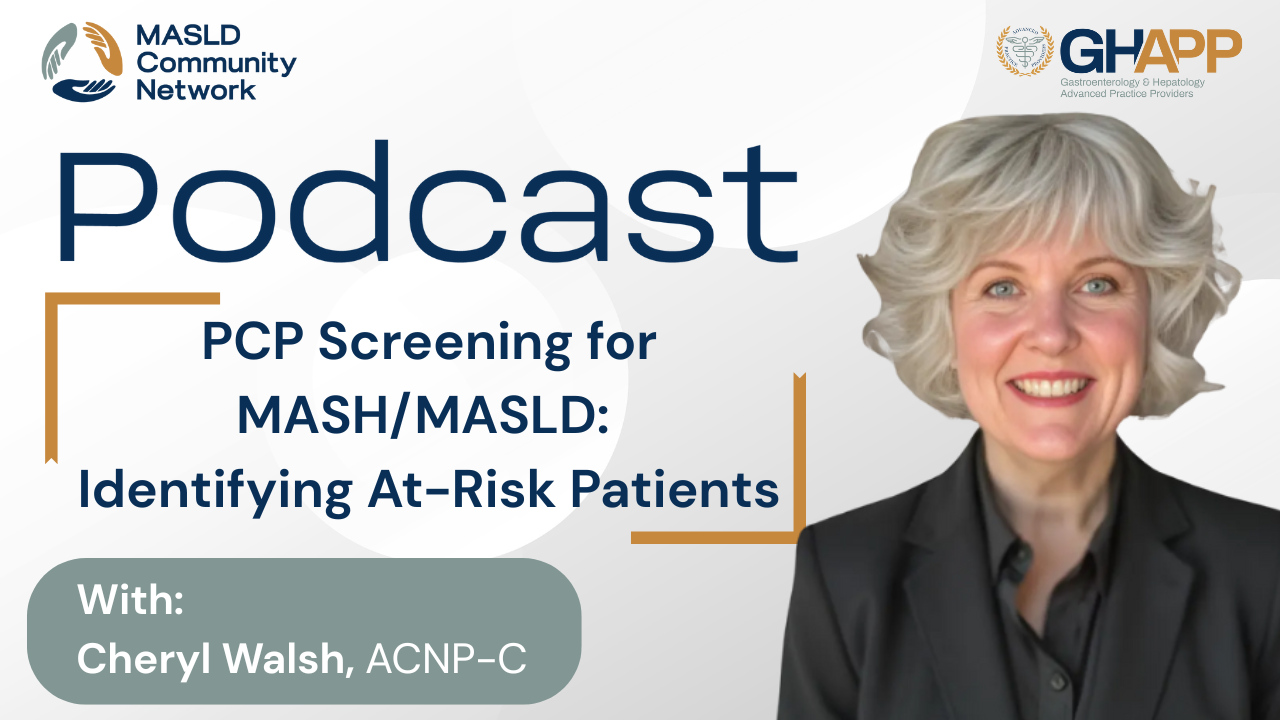
PCP Screening for MASH/MASLD: Identifying At-Risk Patients

In this educational video, Cheryl Walsh, ACNP-C, from GI Alliance in Arkansas, shares practical guidance on screening for MASH (Metabolic Associated Steatohepatitis) and MASLD (Metabolic Dysfunction–Associated Steatotic Liver Disease) in the primary care setting. Drawing from over 15 years of experience in gastroenterology, Cheryl highlights how nurse practitioners and advanced practice providers can efficiently identify at-risk patients—particularly those with type 2 diabetes, obesity, or cardiometabolic risk factors such as hypertension and elevated triglycerides. She explains how simple, validated tools like the FIB-4 index and ELF score can be incorporated into routine labs to detect early signs of fibrosis and liver disease progression. Cheryl also discusses communicating positive results, setting appropriate follow-up intervals, and empowering patients through lifestyle modifications and diet counseling. By streamlining screening into busy primary care workflows, clinicians can play a vital role in early detection and prevention of advanced liver disease.
Watch Now





 July 2025
July 2025 